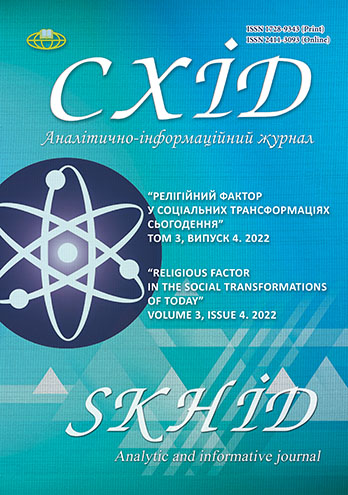Eurasian matrix of post-soviet protestantism, its manifestations in modern Ukraine
DOI:
https://doi.org/10.21847/1728-9343.2022.3(4).269123Keywords:
Russia, Soviet Union, Ukraine, “Russian world”, Eurasianism, Rashism, Protestantism, Russian-Ukrainian warAbstract
The article researches the current topic of "post-Soviet Protestantism" and its positioning in acute socio-political issues, particularly in the issues of attitude to the Russian aggression against Ukraine. It is proved that the basis of the Russocentrism of post-Soviet Protestantism is Eurasianism as a doctrine of Russian fascism, which proclaims the ideas of the Russian-Asian community in opposition to all others, including the community of Slavs. In addition, it advocates neo-Stalinism and Putin's neo-colonialism. The author compares the two basic concepts of Eurasianism and the "Russian world" for modern Russian geopolitics and suggests that Eurasianism implies the substantial inclusion of numerous Protestant movements in the former Soviet territories into the political system of the Kremlin with its further "orthodoxization" in the Eurasian format. While Russian Orthodoxy prefers to subjugate the entire post-Soviet space to the neo-imperial project of the "Russian world," envisaging the unification of Slavism in the former Soviet geopolitical area, post-Soviet Protestantism is focused on keeping the post-Soviet space in the Eurasian political field. At the same time, by analysing the structure and internal politics of modern post-Soviet Protestantism, the author proves that despite all its (Protestantism's) heterogeneity, it has uniquely retained the general features of Soviet-style Baptism. Moreover, it is prone to establishing private institutions and subcultures based on rejection rather than positive self-identification. The results obtained in the course of the study give grounds to significantly adjust the existing ideas about post-Soviet Protestantism, to comprehend its political component in a panoramic and retrospective manner. Therefore, the study states that the officially advocated by post-Soviet Protestants (primarily Baptists and Adventists) idea of the so-called "Euro-Asian" missionary activity is in line with Putin's Eurasian ideology and, consequently, acts within the defined "canons" of Russia's neo-imperial policy.
Downloads
References
Cherenkov, M. (2016). Evangelskie protestanty Evrazii: aktivnaya missiya v usloviyakh ogranichennoi svobody. Relihiia v Ukraini. 1.11.2016. https://www.religion.in.ua/zmi/ukrainian_zmi/34414-evangelskie-protestanty-evrazii-aktivnaya-missiya-v-usloviyax-ogranichennoj-svobody.html (In Russian).
Dmitruk, Igor (2014). Filosofiya i separatizm ili ideologiya putinskogo evraziistva. Filosofiia i Relihiieznavstvo. 23 квітня 2014. http://tureligious.com.ua/fylosofyya-y-separatyzm-yly-ydeolohyya-putynskoho-evrazyjstva/ (In Russian)
Evraziistvo (opyt sistematicheskogo izlozheniya) (1926). Parizh-Berlin: Evraziiskoe knigoizdatelstvo (In Russian).
Filatov, A.S. (2017). Evraziiskii soyuz: ideinye osnovaniya i politicheskaya realnost. Kulturologicheskii zhurnal. 1 (27). http://cr-journal.ru/rus/journals/395.html&j_id=30 (In Russian).
Kantor, Maksim (2014). Prizrak Evrazii. Russkoe pole. 2014. №10. http://www.ruspole.info/taxonomy/term/1157
Kolodnyy, A. (ed.) (2014). “Russkyy myr” Kyryla ne dlya Ukrayiny. Kyiv, UAR (In Ukrainian)
Kolodnyy, A. (ed.) (2019). Relihiyna bezpeka/nebezpeka Ukrayiny. Kyiv, UAR (In Ukrainian).
Romaniuk, M. (2016, November, 9). Ukrainski baptysty i movne pytannia. Scripta – blog Mykoly Romaniuka. 2016. Retrieved from: http://www.rmikola.com/pohlyad/ukrayinski-baptysty-i-movne-pytannya.html (In Ukrainian)
Savitskii, P.N. (2002). Evraziistvo. Osnovy evraziistva. Moscow, Arktogeya-tsentr (In Russian).
Stalin, I.V. (1946). Sochineniya. Vol. 2. Moscow: OGIZ (In Russian).
Tselostnaya missiya v usloviyakh voiny. Paket idei (2017). Missiya v Evrazii: opyt i novye initsiativy evangel'skikh tserkvei. Chast' 5. Issledovatel'skaya initsiativa «Re-Vision». Kiev (In Russian).
Downloads
Published
How to Cite
Issue
Section
License
Copyright (c) 2022 Павло Павленко

This work is licensed under a Creative Commons Attribution-NonCommercial-NoDerivatives 4.0 International License.
1. Authors bear responsibility for the accuracy of facts, quotations, numbers and names used.
2. Manuscripts are not sent back.
3. The publisher does not always agree with the authors' opinion.
4. The authors reserve the right to authorship of the work and pass the first publication right of this work to the journal under the terms of a Creative Commons Attribution-NonCommercial-NoDerivatives 4.0 International License. This license allows others to distribute (copy) the published work for non-commercial purposes, provided there is mandatory attribution to its authors and a link to the first publication in our journal.
5. The authors have the right to conclude separate supplement agreements that relate to non-exclusive work distribution in the form in which it has been published by the journal (for example, to upload the work to the online storage of the journal or publish it as part of a monograph), provided that the reference to the first publication of the work in this journal is included.

